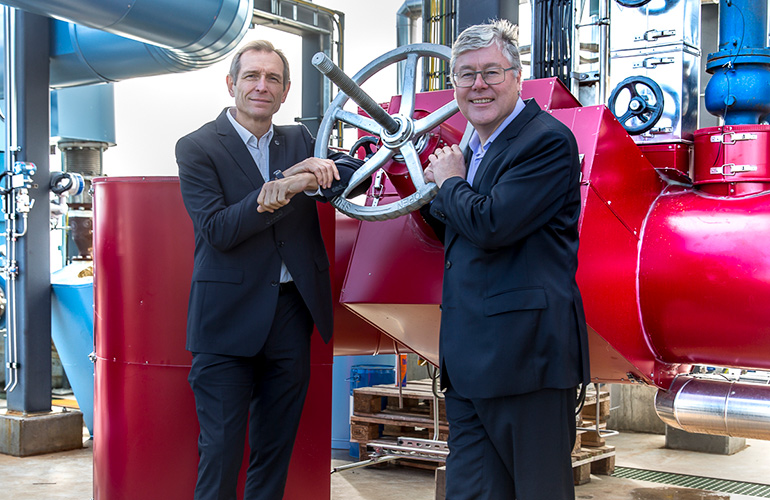In order to be even more energy efficient the mill is constantly seeking for smart ways to increase the use of its assets and reduce fossil carbon dioxide emissions. Starting a long-term cooperation with Volvo Cars fits the picture perfectly.
Mutual benefit for a common cause
After over a year of constructions, the new pipeline was finally opened on 18 November 2016. The brand new pipeline will carry 125 °C water from Stora Enso´s mill to heat buildings and paint booths at Volvo Cars plant.“The construction of a system of industrial district heating outside our premises and the delivery of external renewable energy to Volvo Car Gent will lead to increased energy efficiency, which is beneficial to the environment and increases the use of our resources,” says Chris De Hollander, Managing Director of Langerbrugge Mill. The project is however not unprecedented in Stora Enso as twelve of Stora Enso's mills are currently connected to local district heating systems, significantly reducing the use of oil and other fossil fuels in these localities.
The new pipeline ensures that Volvo Cars uses substantially less fossil fuels for heating – which reduces both the plant’s CO<sub>2</sub> emissions and energy costs. The project will lead to annual emission savings of around 15 000 tonnes of CO<sub>2</sub> per year, and will reduce the plant’s total CO<sub>2</sub> emissions by more than 40 percent. The annual reductions correspond to the heating requirements of 5 000 households.
“We are extremely pleased to be able to lower our CO<sub>2</sub> emissions and energy costs in line with our efforts to improve our internal efficiency and promote sustainability, both in the cars we make and in our production processes,” adds Eric Van Landeghem, Managing Director of Volvo Car Gent.
Partnering on climate action
Both Stora Enso and Volvo Car Gent are committed to combatting global warming. The Volvo Car Group has an ambition to be among the leaders in climate neutral operations and energy efficiency, and the joint project with Stora Enso takes the company a significant step closer to this goal - reducing its Europe-wide CO<sub>2</sub> emissions by 24 percent.Stora Enso has committed to reduce the company’s use of fossil fuels to as close to zero as is technically and economically feasible over the next ten years. “The cooperation with Volvo Cars is a good example of the collaborative efforts Stora Enso is taking to combat global warming,” explains Noel Morrin, Executive Vice President for Sustainability at Stora Enso.
“Long-term sustainable development requires partnerships between governments, the private sector and civil society. No company can solve global warming alone and innovative business partnerships like this can be a powerful source of advocacy, setting the course for a carbon neutral economy and unlocking potential green growth. ” Morrin concludes.

Eric Van Landeghem, Managing director of Volvo Car Gent, and Chris De Hollander, Managing Director of Stora Enso Langerbrugge Mill.





